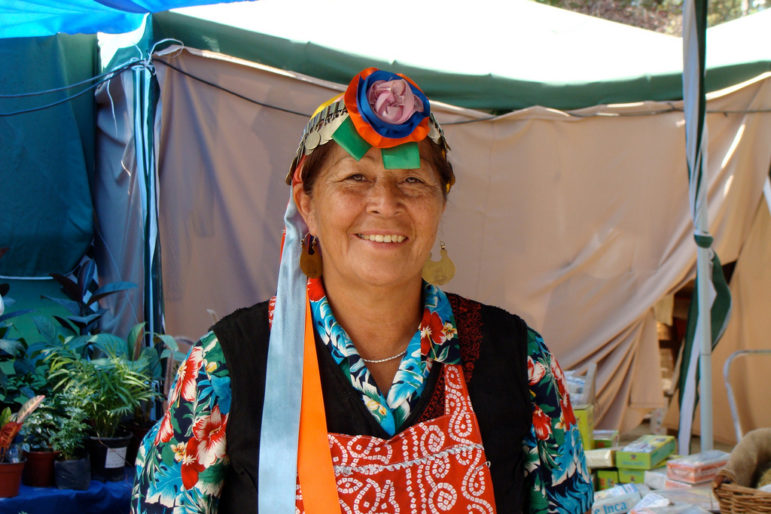
Update, 9/4/22, 9:00 PM EST: The Guardian reports that Chilean voters have rejected the proposed constitution with 62% opposing.
Today, Chileans are voting on a new, progressive constitution that may herald an era that brings Indigenous issues and concerns to the fore in both national political and international dialogue. The new constitution is the consequence of a plebiscite on October 25, 2020, where almost 80% of the population voted in favor of a new political constitution.
Chile’s population is 12.8% Indigenous. The largest populations are Mapuche, Aymara, Diaguita, Lickanantay, and Quechua. These and other Indigenous communities suffered tremendously under the dictatorship of Augusto Pinochet, which ended in 1990. Since the downfall of the dictatorship, numerous attempts to legally recognize Indigenous communities have failed. Despite Chile signing the International Labor Organization’s Convention 169 and the United Nations Declaration on the Rights of Indigenous Peoples, what few rights were present were chipped away by constitutional rulings that appropriated Indigenous control of land, mineral rights, and water in favor of business interests.

The Wiphala, an emblem that is a square emblem commonly used as a flag to represent some Indigenous peoples of the Andes including those in today’s Peru, Bolivia, Chile, Ecuador, northwestern Argentina, and southern Colombia.
The proposed constitution defines Chile as a “plurinational state,” one that recognizes that the state is composed of many peoples organized under one polity – that is, that many nations exist under one government. Plurinationalism (plurinacionalidad) is a term that emerged out of the Indigenous rights movements in Latin America and remains an obscure term in the Anglosphere.
Nevertheless, the concept has already gained some traction as a boogeyman that portends danger and foments political instability. Some suggest it will destroy free markets and eliminate unity. Others say it ends institutionalized privileges.
The proposed Chilean constitutional process has been unprecedented in its attempts to address and ensure cultural, social, and economic rights. The proposed constitution specifically contains obligations for Indigenous consultation on political issues, the recognition of autonomous territories for Indigenous peoples, and the recognition of Indigenous justice. It also reserves 17 seats out of the 155 in Chile’s national assembly for Indigenous peoples, while also re-asserting the human rights of vulnerable groups and securing access to justice. The proposed constitution even includes rights of reparation for women, African descendants, and LGBTI people, and ensures rights to abortion, universal health care, and the rights of nature.
Other nations have attempted plurinationality since the movement emerged and the term came to prominence in the 1980s. Guatemala, Ecuador, and Bolivia both have adopted this status, the latter having an even larger Indigenous population than Chile. Guatemala has even made plurinationality a cornerstone of political discourse.
None of these countries, however, has effectively eliminated discrimination and racism against Indigenous communities.
In a statement released last month by Chile’s current governing coalition, the groups hoped to clarify the powers gained by Indigenous communities and stated they remain “united to approve a new constitution.” They noted that “regarding Indigenous consultation, it is restricted to matters directly impacting Indigenous communities” and that autonomous territories are extant boundaries and will not “limit the right of any inhabitant of the Republic to move freely throughout the national territory, respecting the Constitution and the laws.”
“The Constitution will be developed in accordance with the principles of unity and indivisibility of the State of Chile and the freedoms recognized and protected for all people,” the statement noted.
The most seemingly controversial issue is Indigenous justice, and on that matter, the coalition noted that “there will be no parallel justice regimes that call into question the unity, coherence, and consistency of the Judiciary. Indigenous justice will only apply to members of the same people, it will be voluntary, and will not have jurisdiction over criminal offenses.”
Indeed, the proposed constitution simply enshrines the rights of Indigenous people already codified in the United Nations Declaration on the Rights of Indigenous Peoples.
Moreover, some of these new constitutional privileges already exist in other nations, but not under the plurinational name. The Maori of New Zealand have had parliamentary representations and guaranteed quotas since 1867. The United States has self-governing national tribes of Native Americans and Native Alaskans. The same is true in Canada’s First Nations, enshrined in Section 35 of the Constitution Act of 1982.
None of these nations has effectively eliminated discrimination and racism against Indigenous communities either, however. Hatred has allies around the world.
Chile today is undergoing a test of whether it will forge an inclusive future, a more perfect union that tries to address the reality of Indigenous racism and dehumanization that many nations continue to ignore.

A member of the Chilean Mapuche nation, 2012 [Raul Urzua, Wikimedia Commons, CC 2.0]
As an example of Indigenous dehumanization, we need to look no further than the Man of the Hole.
The Man of the Hole was a member of an Indigenous community who lived in the Tanaru Indigenous Territory in southwestern Brazil’s Rondônia state, which borders Bolivia. The person nicknamed the Man of the Hole was likely the last of a mostly uncontacted ethnic group who spoke a language unknown to us. We do not know his name.
Since 1996, the Fundação Nacional do Índio (Brazil’s National Indian Foundation or FUNAI) interacted with the Man of the Hole at a distance. But he continued to live in isolation, growing corn and taro and hunting while leaving behind straw huts that always contained a 10-foot deep hole of unknown purpose that gave rise to his nickname.
He survived multiple attacks by ranchers, the last in 2018, which instigated FUNAI to release a video of his existence to raise awareness.
The holes he created were thought to be for hunting and trapping, but some observations suggested that they had a spiritual purpose.
We will never know. It was also never our right to know.
The Man in the Hole was found dead by FUNAI agent Altair José Algayer on 24 August 2022. The agent said his body was found lying down in a hammock covered with macaw feathers outside one of his huts. Indigenous expert Marcelo dos Santos told local media that he thought the man had placed the feathers on himself, knowing that he was about to die. “He was waiting for death, there were no signs of violence,” he said, adding that the Man in the Hole had probably died 40 to 50 days before his body was found.
FUNAI protected what agency he had that was transmitted by his behaviors. Nevertheless, ranchers encroached on his lands, his images were broadcast, and like many other Indigenous people, he was the target of violence because he existed.
Back in Chile, Elisa Loncon, president of Chile’s constitutional assembly and a member of the Mapuche Indigenous community, said, “For the first time in our history, Chileans from all walks of life and from all political factions are participating in a democratic dialogue.
“Hope is returning to human beings,” Loncon said. “What we are seeing is a human dream.”
If nothing else, Chile’s groundbreaking vote today will remind us again how much work remains to secure Indigenous rights.
The Wild Hunt is not responsible for links to external content.
To join a conversation on this post:
Visit our The Wild Hunt subreddit! Point your favorite browser to https://www.reddit.com/r/The_Wild_Hunt_News/, then click “JOIN”. Make sure to click the bell, too, to be notified of new articles posted to our subreddit.